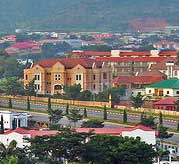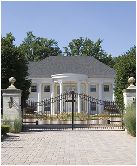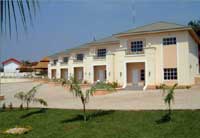Very high costs, corruption-prone system
How high are realtors´ and lawyers´ fees in Nigeria? What about other property purchase costs?
Transaction Costs |
||
| Who Pays? | ||
| Consent Fee | 8% | buyer |
| Registration Fee | 3% | buyer |
| Stamp Duty | 2% | buyer |
| Legal Fee | 7.5% 5% |
buyer seller |
| Real Estate Agent´s Fee | 1% - 2.75% (+ 5% VAT) 1% - 2.75% (+ 5% VAT) |
buyer seller |
| Costs paid by buyer | 21.55% - 23.3875% | |
| Costs paid by seller | 6.05% - 7.8875% | |
| ROUNDTRIP TRANSACTION COSTS | 27.60% - 31.275% | |
| See Footnotes Source: Global Property Guide |
||
How difficult is the property purchase process in Nigeria?
Foreigners can obtain leases from the State for a maximum of 99 years for the use of land.
 The Land Use Act of 1978 converted all land to State Land. The Governor of the State is responsible for the management of this land on behalf of the people. Therefore, land cannot be owned privately. The Governor´s consent is needed for the assignment of title to use, occupy, and improve property with a statutory certificate. This certificate does not include rights to sell, give, or sub-let, which requires further consent from the State Governor.
The Land Use Act of 1978 converted all land to State Land. The Governor of the State is responsible for the management of this land on behalf of the people. Therefore, land cannot be owned privately. The Governor´s consent is needed for the assignment of title to use, occupy, and improve property with a statutory certificate. This certificate does not include rights to sell, give, or sub-let, which requires further consent from the State Governor.
A peculiarity about purchase of property in Nigeria, particularly in Lagos, is the Consent Fee. The logic is that the state government is the owner of land and therefore any change in ownership or assignment, in case of a lease, should have the consent of the Governor.
There is also a Capital Gains Tax levied at 10% of the difference between the sale price and the original acquisition tax. This is assessed by the Ministry of Finance.
 Before purchasing, it is important to make sure that consent from the Governor is obtained for the sale. No land can be "sold" without this consent.
Before purchasing, it is important to make sure that consent from the Governor is obtained for the sale. No land can be "sold" without this consent.
Sale of real estate, however, does not involve actual selling and purchasing. There is only the transfer of rights from one person to another. This transaction is usually called an ´assignment´. The seller assigns the rights to use and occupy the land to the buyer. After the transaction, the buyer applies for a new (statutory) certificate under his name. In this case, the seller acts as the assigner, and the buyer is the assignee.
The buyer/assignee´s lawyer checks the title and other documents presented by the seller/assigner before continuing with the transaction. It is better to be safe, since there are several restrictions and conditions that come with a title, and the buyer has to make sure of what s/he is getting. There are even instances where the assigner is selling land that s/he does not own.
Purchasing property in Nigeria is not without risks - expropriation and others. Two laws make land ownership uncertain in Nigeria. Although these laws have their counterpart in most countries, it is the implementation that really matters. The Petroleum Act of 1969 and Land Use Act of 1978 allow the government to take over land under the state´s right to eminent domain. The compensation scheme covers only the "unexhausted improvements" to the land but not the land itself. The value is also fixed to a government rate which was set in the year the law was created. These factors combined with corruption and years of autocratic rule, mean that uncompensated expropriation of property is common.
 Another problem is the cadastral situation of the country. The country still has border disputes with Cameroon in the South. The field tracing and provisional demarcation of interstate borders between the 36 states is not yet finished. The last time that a topographical map of the country was made was in 1957 and it was at a scale of 1 : 250,000 [practically useless for individual property owners]. There is program to bring the scale down to 1 : 50,000.
Another problem is the cadastral situation of the country. The country still has border disputes with Cameroon in the South. The field tracing and provisional demarcation of interstate borders between the 36 states is not yet finished. The last time that a topographical map of the country was made was in 1957 and it was at a scale of 1 : 250,000 [practically useless for individual property owners]. There is program to bring the scale down to 1 : 50,000.
Nevertheless, taking money out of the country should not be a worry for foreigners. According to the Nigerian Investment Promotion Commission (NIPC) Act No. 16 of 1995, foreign investors are guaranteed unconditional transferability of their dividends, profits and loan repayments.
Footnotes to Transaction Costs Table
The round trip transaction costs include all costs of buying and then re-selling a property - lawyers´ fees, notaries´ fees, registration fees, taxes, agents´ fees, etc.

 Legal Fee
Legal Fee
Legal fees are around NGN8,750 (US$44) to NGN10,000 (US$50), plus a flat rate on the property value exceeding NGN20,000 (US$101). Legal fees are levied at a rate of 7.5% for the buyer, and at a rate of 5% for the seller.

 Real Estate Agent´s Fee
Real Estate Agent´s Fee
The real estate broker´s commission can be calculated according to the following scale, as regulated by the Securities and Exchange Commission (SEC):
REAL ESTATE AGENT´S COMMISSION |
|
| CONSIDERATION, NGN (US$) | RATE |
| Up to 500,000 (US$2,513) | 2.75% |
| 500,000 - 1,000,000 (US$5,025) | 2.25% |
| 1,000,000 - 3,000,000 (US$15,075) | 2.00% |
| 3,000,000 - 5,000,000 (US$25,126) | 1.50% |
| Over 5,000,000 (US$25,126) | 1.00% |